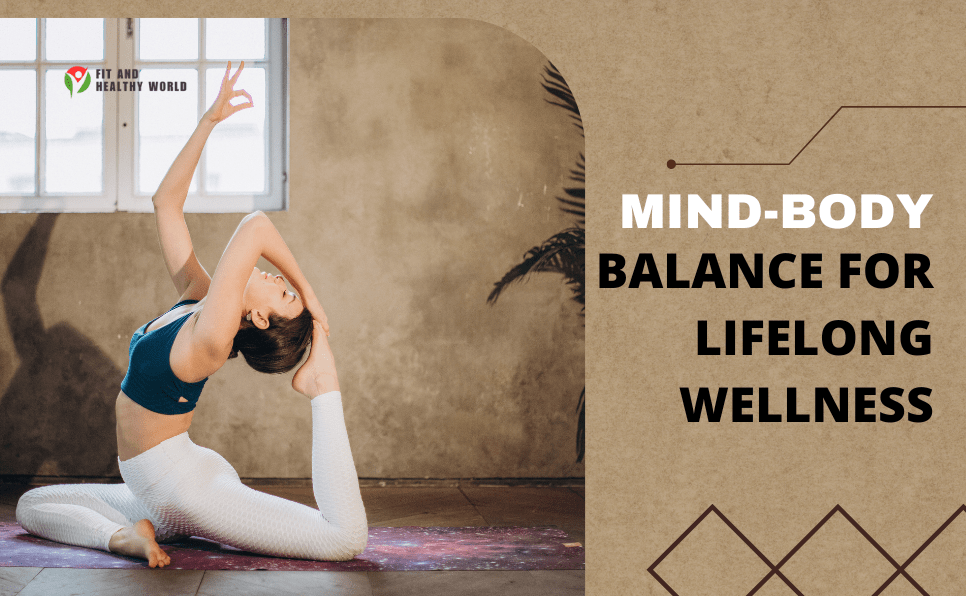Keeping up a healthy, expressive life requires balancing the mind and body. More vitality, resilience, and general happiness are experienced when our mental and physical states are in balance. Maintaining this equilibrium between the mind and body requires easy, regular routines that support both. With these methods, you can develop a long-lasting bond between your mind and body, from physical vigor to mental clarity and emotional resilience. Let’s look at doable strategies for completing mental and physical equilibrium that fit into everyday schedules. visit Fit and Healthy World.
Recognizing the Significance of Mind-Body Balance
Describe Mind-Body Balance
A condition of mind and body balance occurs when our mental and physical states are in harmony and support our general well-being. We enjoy improved physical health, stable emotions, and clear thinking when we achieve this balance. Imagine having the energy and drive to work for your objectives or feeling poised and focused under pressure. You can get that with the aid of a balanced body and mind.
Decision-making and problem-solving are made easier when the mind is at ease.
Physical Vitality: Having good health lowers stress and increases energy, which affects mood.
Emotional resilience is the ability to manage life’s ups and downs more expertly when our mental and bodily states are in balance.
Positive habits that lay the groundwork for long-term health and happiness are fostered by this equilibrium. To achieve equilibrium, one must first acknowledge this link.
To cultivate emotional steadiness and mental clarity
Developing Meditation and Mindfulness
Meditating and practicing mindfulness are effective methods for promoting mental equilibrium and relaxation. Being watchful is concentrating on the here and now without passing judgment. This practice is strengthened by meditation, which helps us attain a calm, relaxed condition and clear our minds.
Easy Mindfulness Practices: Begin with a 5-minute guided meditation or mindful breathing session.
Regular musing practice has several advantages, including lowering stress, improving focus, and fostering emotional resilience.
Developing emotional balance and resilience via daily mindfulness practice will help you manage stress and unpleasant feelings.
Applying Self-Affirmations and Positive Opinions
Thinking positively entails actively intent on constructive ideas and rephrasing negative ones. Positive self-talk, or self-affirmations, can boost self-esteem and promote a positive outlook.
Self-Affirmation Advice: Repeat words that align with your objectives every day.
The advantages of positivity include promotion of an optimistic outlook and enhancing emotional stability.
Despite their apparent simplicity, affirmations and positive thinking have a significant impact on one’s physical and mental health. You create the foundation for a healthier and upbeat mentality by nurturing mental clarity and emotional equilibrium.
To Promote Mind-Body Balance, Physical Activity
The Linking Between Exercise and Mental Health
Recurrent physical activity is one of the finest strategies to balance the mind and body. Exercise triggers the release of endorphins, occasionally referred to as “feel-good” hormones, which improve mood and reduce stress.
- Methods of Mindful Exercise: Pilates, yoga, and tai chi are excellent for emphasizing the mind-body connection.
- Daily Movement: Exercise, extending, and dancing are all beneficial to the body and mind. visit Fit and Healthy World.
Using Good Posture and Body Awareness Techniques
Being conscious of how you move and hold your body is known as body awareness. In addition to being more aesthetically pleasing, proper posture also lowers bodily tension and fosters serenity.
- Straightforward Posture Advice: When standing, maintain a regressive posture and equally distribute your weight.
- Exercises for Body Awareness: To improve alertness and lower stress, try concentrating on each body component as you move.
A stouter bond between your mental and physical moods is fostered by including regular movement and body awareness. It also gives you a sense of energization and stability.
Consuming Food for Harmonious Energy and Mental Focus
Using Balanced Nutrition to Fuel the Body
Consuming healthy foods aids in controlling mental attention and energy levels. A balanced diet full of nutritious grains, fruits, veggies, and lean meats is what you should strive for. These foods maintain physical health, enhance concentration, and fuel the brain.
- Emphasis on Whole Foods: Nutrient-dense sources of vital elements include leafy greens, nuts, and lean meats.
- Avoid processed foods: They frequently contain additives that throw off equilibrium, leading to energy dips and surges.
Hydration for the Health of the Brain and Body
Lack of focus, irritation, and fatigue can result from dehydration. Regular water fasting helps maintain mental and physical functions, keeping you balanced and attentive.
During the day, sip water and include foods high in water, such as oranges or cucumbers, in your meals.
Water or herbal teas are healthier choices than sugary drinks, which can trigger energy ruins.
Maintaining proper hydration and nourishment is essential for mind-body harmony. The proper diet promotes physical and mental well-being as well as energy levels.
For Mind-Body Balance, Establishing Routines and Providing Flexibility
Creating Daily Routines for Evenness
Daily routines give things structure, which helps you keep your body and mind in balance. Establishing a routine fosters a rhythm that promotes wellbeing and helps lower stress. Start and finish each day with little routines that support your objectives.
- Morning routines: Begin with some stretching, a gratitude exercise, or a brief meditation session.
- Evening Routines: Take some time to calm yourself by writing, reading lightly, or thinking back on the day.
Accepting Self-Compassion and Adaptability
The goal of balance is not excellence. Being adaptable and kind to yourself is crucial while attempting to achieve mind-body balance. Remember to take breaks and give yourself consent to adjust to changes.
- Developing Self-Compassion: Be kind to yourself when you fail and acknowledge your improvement.
- Routine Adjustment: Your routine may need to adjust as life does. To maintain a tolerable and pleasing balance, adjust as necessary.
A solid basis for long-lasting mind-body harmony is established by establishing routines and allowing flexibility.
Conclusion
Instead of being a goal, mind-body balance is a trip. A balanced, satisfying existence that supports your mental and physical health can be advanced via routines, exercise, mindfulness, and diet. Accept these performances with open arms, and keep in mind that every little step takes you one step closer to mental-physical balance. visit Fit and Healthy World.
Answers to Common Questions (FAQs)
Mind and body balance: what is it?
Mental and physical well-being that accompaniments one another for general health and vigor is known as mind-body balance.
What are some ways to maintain mental and physical equilibrium?
By being mindful, exercising, eating healthily, and upholding even habits that support both mental and physical states, balance can be reached.
How can the body-mind balance be fostered?
Create balance in your life by applying techniques like regular exercise, meditation, positive thinking, and a healthy diet.
Who said the mind and body should be in balance?
Balance between the mind and body is vital for a healthy, happy life, according to several philosophers, including Aristotle.
How can the mind and body be in accord for optimal health?
It is feasible to attain balance for overall well-being through self-care, adaptability, and consistency in daily routines.



